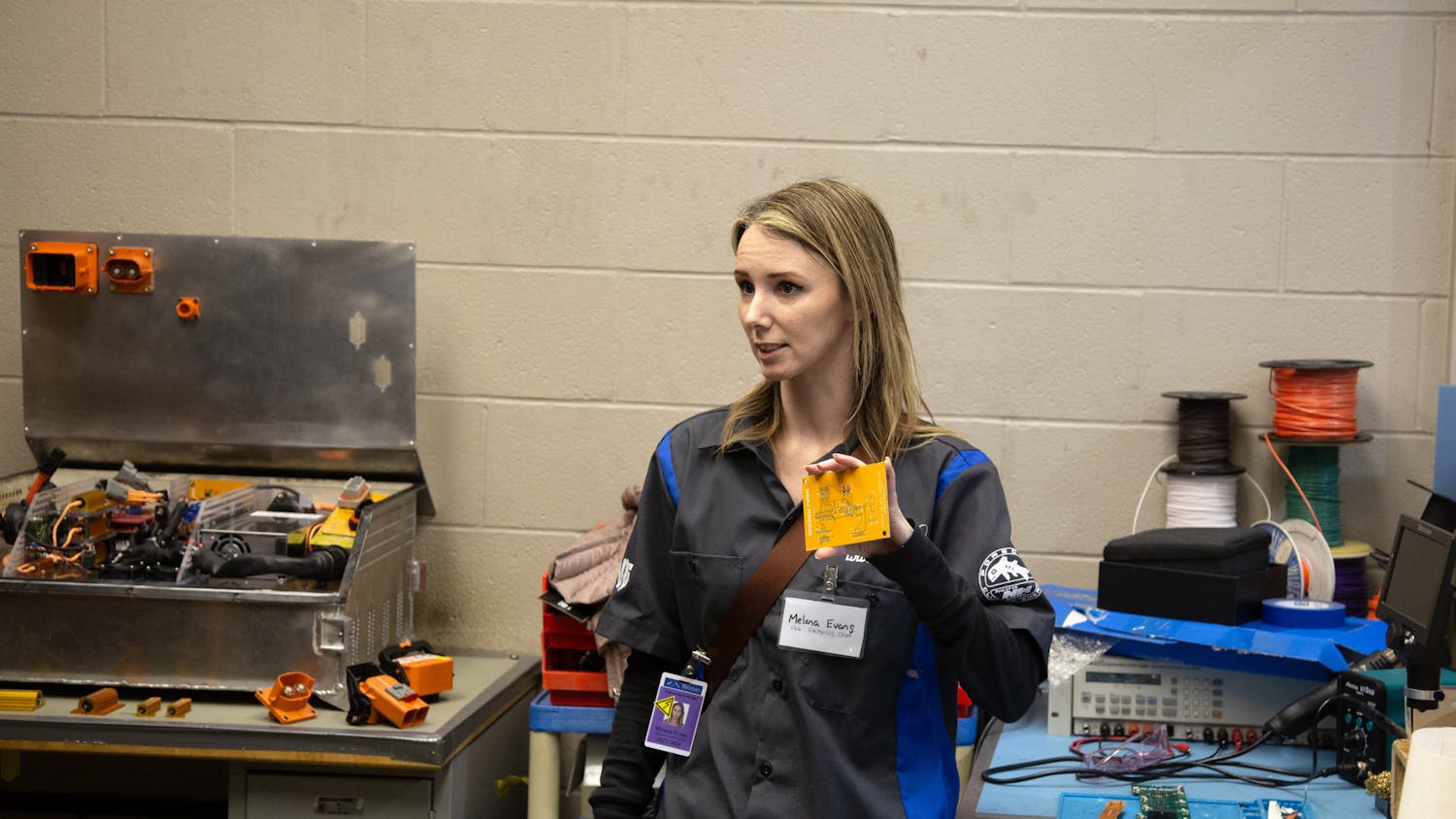 The NFL Draft is supposed to be a time of excitement.
For the young players drafted, it is a culmination of all the hard work and dedication they have put toward their sports for most of their young lives. For teams, it is the hope that picking these young men will help lead the team to greatness.
Last week, those who watched the 2016 NFL Draft were treated to one of the most unusual dramas to ever be broadcast in the event’s history.
Minutes before teams were scheduled to begin choosing which young men would become the newest members of their organization, a video of Ole Miss’s offensive tackle Laremy Tunsil spread around the internet. The video showed Tunsil taking a hit from a bong attached to a gas mask and was posted on Tunsil’s Twitter account by a hacker.
Madness pursued.
Tunsil was originally projected to be the number one overall pick by some. Instead, Tunsil’s embarrassment played out for over an hour on national television as pundits began to question his character and team after team passed on him. Eventually, he was selected by the Miami Dolphins with the 13th pick of the draft.
Tunsil’s fall in the draft cost him somewhere between $8-13 million, according to Fortune Magazine.
Tunsil was lucky. He still gets to play the sport he loves and earn millions of dollars for doing so. Recent reports state he also won’t be subjected to the NFL’s strict drug program, since the video appears to be from a few years ago.
Still, the Tunsil saga and Roger Goodell’s tasteless comments on how “exciting” the ordeal was brings forth an interesting question:
Why was the video of him smoking so potentially detrimental to his career?
Recreational marijuana is legal in Alaska, Colorado, Oregon and Washington. Medical marijuana is legal in 24 states. Other sports leagues like the NBA and MLB have similar drug policies, but are far more lax in terms of punishment. The MLB doesn’t even suspend a player who tests positive for marijuana, electing to levy fines instead.
Why is the NFL so against its players using marijuana?
The NFL Draft is supposed to be a time of excitement.
For the young players drafted, it is a culmination of all the hard work and dedication they have put toward their sports for most of their young lives. For teams, it is the hope that picking these young men will help lead the team to greatness.
Last week, those who watched the 2016 NFL Draft were treated to one of the most unusual dramas to ever be broadcast in the event’s history.
Minutes before teams were scheduled to begin choosing which young men would become the newest members of their organization, a video of Ole Miss’s offensive tackle Laremy Tunsil spread around the internet. The video showed Tunsil taking a hit from a bong attached to a gas mask and was posted on Tunsil’s Twitter account by a hacker.
Madness pursued.
Tunsil was originally projected to be the number one overall pick by some. Instead, Tunsil’s embarrassment played out for over an hour on national television as pundits began to question his character and team after team passed on him. Eventually, he was selected by the Miami Dolphins with the 13th pick of the draft.
Tunsil’s fall in the draft cost him somewhere between $8-13 million, according to Fortune Magazine.
Tunsil was lucky. He still gets to play the sport he loves and earn millions of dollars for doing so. Recent reports state he also won’t be subjected to the NFL’s strict drug program, since the video appears to be from a few years ago.
Still, the Tunsil saga and Roger Goodell’s tasteless comments on how “exciting” the ordeal was brings forth an interesting question:
Why was the video of him smoking so potentially detrimental to his career?
Recreational marijuana is legal in Alaska, Colorado, Oregon and Washington. Medical marijuana is legal in 24 states. Other sports leagues like the NBA and MLB have similar drug policies, but are far more lax in terms of punishment. The MLB doesn’t even suspend a player who tests positive for marijuana, electing to levy fines instead.
Why is the NFL so against its players using marijuana?
"The issue goes much deeper than just getting high."
Professional football isn’t like any other career. Football involves large individuals colliding with each other at high speeds over and over again.
"Your job automatically gives you the symptom of chronic pain," Baltimore Ravens offensive tackle Eugene Monroe said in an interview with CNN. "You're hitting each other as hard as possible every single day in practice. Your body is in pain a lot of time."
It’s not like marijuana is a performance enhancing drug, it just helps out with the pain that comes with slamming into people all day.
The league’s policy states players entered in the drug program are banned from using drugs such as cocaine, marijuana, amphetamines, opiates, opioids and alcohol. The players are then subjected to frequent drug tests. However, alcohol is only prohibited if the Player’s Treatment Plan prohibits it.
Because of the chronic pain that comes with being a football player, more players are turning to marijuana for a pain reliever because of the fear of becoming addicted or overdosing on painkillers, according to a CNN article.
It’s a valid point.
During a football game it’s almost guaranteed a player will leave the field due to injury. According to ABC News, there are 6.6 injuries sustained in a given game.
The NFL has said it is beginning to focus more on player safety. If that is the case, then why is the league so harsh on players who use marijuana as an alternate form of pain relief to pain killers?
Many players in the NFL have faced consequences for violating the NFL Policy and Program on Substance of Abuse. Cleveland Browns wide receiver Josh Gordon was suspended for one year without pay for testing positive for weed and alcohol. He has yet to be reinstated by the league. Ricky Williams was suspended during the 2006 season after testing positive for marijuana and even briefly retired because of it.
Pittsburgh Steelers wide receiver Martavis Bryant was also suspended for a year for violating the policy and as of March of 2016, is planning to check into a rehab facility. Bryant has reportedly suffered from depression and was using marijuana to cope.
Bryant isn’t the only player in the NFL to suffer depression.
Former New Orleans Saints tight end Eddie “Boo” Williams attempted suicide after retiring from the NFL. Williams laid down on train tracks and was only saved after a homeless couple pulled him from the tracks. Hall of Fame linebacker Junior Seau took his life in May 2012.
An ESPN article said it was discovered that Seau suffered from chronic traumatic encephalopathy, a buildup of a protein called tau, which is caused by repeated hits to the head.
The issue goes much deeper than just getting high. Tetrahydrocannabinol, more commonly known as THC, is the chemical found in marijuana that makes people feel high but it can also serve as a pain reliever. It has been known to help chemotherapy patients regain their appetite and help with symptoms of epilepsy.
I think it’s time the NFL catches up with the rest of the United States. It’s time these players have a choice on how they manage their pain and their life outside of football.
 The NFL Draft is supposed to be a time of excitement.
For the young players drafted, it is a culmination of all the hard work and dedication they have put toward their sports for most of their young lives. For teams, it is the hope that picking these young men will help lead the team to greatness.
Last week, those who watched the 2016 NFL Draft were treated to one of the most unusual dramas to ever be broadcast in the event’s history.
Minutes before teams were scheduled to begin choosing which young men would become the newest members of their organization, a video of Ole Miss’s offensive tackle Laremy Tunsil spread around the internet. The video showed Tunsil taking a hit from a bong attached to a gas mask and was posted on Tunsil’s Twitter account by a hacker.
Madness pursued.
Tunsil was originally projected to be the number one overall pick by some. Instead, Tunsil’s embarrassment played out for over an hour on national television as pundits began to question his character and team after team passed on him. Eventually, he was selected by the Miami Dolphins with the 13th pick of the draft.
Tunsil’s fall in the draft cost him somewhere between $8-13 million, according to Fortune Magazine.
Tunsil was lucky. He still gets to play the sport he loves and earn millions of dollars for doing so. Recent reports state he also won’t be subjected to the NFL’s strict drug program, since the video appears to be from a few years ago.
Still, the Tunsil saga and Roger Goodell’s tasteless comments on how “exciting” the ordeal was brings forth an interesting question:
Why was the video of him smoking so potentially detrimental to his career?
Recreational marijuana is legal in Alaska, Colorado, Oregon and Washington. Medical marijuana is legal in 24 states. Other sports leagues like the NBA and MLB have similar drug policies, but are far more lax in terms of punishment. The MLB doesn’t even suspend a player who tests positive for marijuana, electing to levy fines instead.
Why is the NFL so against its players using marijuana?
The NFL Draft is supposed to be a time of excitement.
For the young players drafted, it is a culmination of all the hard work and dedication they have put toward their sports for most of their young lives. For teams, it is the hope that picking these young men will help lead the team to greatness.
Last week, those who watched the 2016 NFL Draft were treated to one of the most unusual dramas to ever be broadcast in the event’s history.
Minutes before teams were scheduled to begin choosing which young men would become the newest members of their organization, a video of Ole Miss’s offensive tackle Laremy Tunsil spread around the internet. The video showed Tunsil taking a hit from a bong attached to a gas mask and was posted on Tunsil’s Twitter account by a hacker.
Madness pursued.
Tunsil was originally projected to be the number one overall pick by some. Instead, Tunsil’s embarrassment played out for over an hour on national television as pundits began to question his character and team after team passed on him. Eventually, he was selected by the Miami Dolphins with the 13th pick of the draft.
Tunsil’s fall in the draft cost him somewhere between $8-13 million, according to Fortune Magazine.
Tunsil was lucky. He still gets to play the sport he loves and earn millions of dollars for doing so. Recent reports state he also won’t be subjected to the NFL’s strict drug program, since the video appears to be from a few years ago.
Still, the Tunsil saga and Roger Goodell’s tasteless comments on how “exciting” the ordeal was brings forth an interesting question:
Why was the video of him smoking so potentially detrimental to his career?
Recreational marijuana is legal in Alaska, Colorado, Oregon and Washington. Medical marijuana is legal in 24 states. Other sports leagues like the NBA and MLB have similar drug policies, but are far more lax in terms of punishment. The MLB doesn’t even suspend a player who tests positive for marijuana, electing to levy fines instead.
Why is the NFL so against its players using marijuana?





